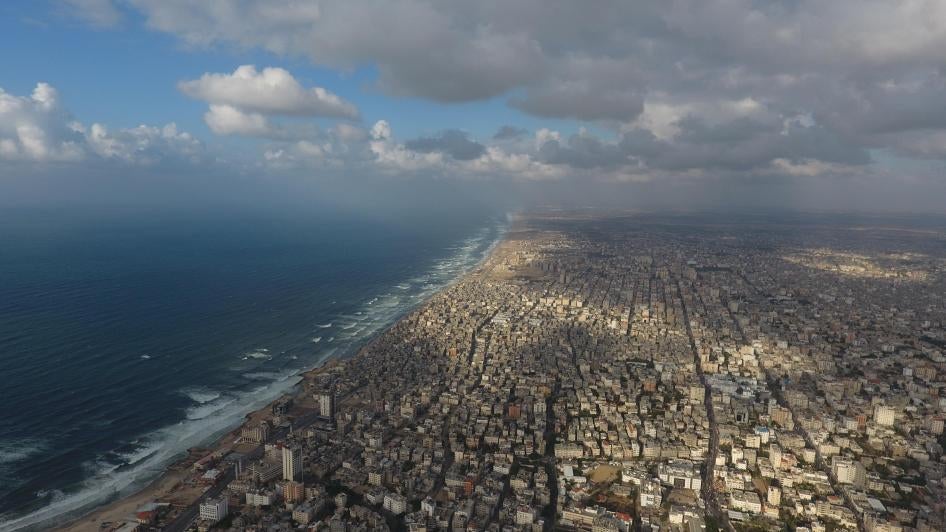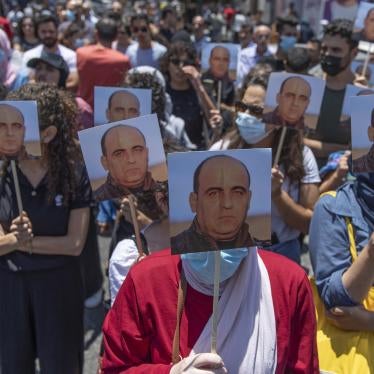Until the international community brings sufficient pressure to push Israeli authorities to abandon their longstanding policy to subdue the Palestinians of Gaza, this vicious cycle will continue.
Clips of Israeli air strikes raining down on Gaza. Images of homes reduced to rubble and the men, women and children buried below. Sirens heralding the latest barrage of Palestinian rockets fired towards Israeli population centres. The dread of a rising death toll. The calls for restraint.
This sequence has played on a loop time and time again in recent years. For those who care about Israel and Palestine, the overwhelming outrage, the feelings of helplessness and the pangs of heartbreak sting each time.
For those in Gaza, it’s a struggle for survival. As my Gaza-based Human Rights Watch colleague Abier al-Masri wrote reflecting on last year’s hostilities: “I struggle to find the words to describe the terror of lying awake at night not knowing if I’d see daylight again, the anguish of those I interviewed who survived the obliteration of their families by Israeli strikes, the agony of seeing Gaza’s prominent towers reduced to mountains of rubble.”
For those in southern Israel, it’s having to “live in consistent fear” during hostilities “that a rocket might fall on our heads at any moment,” as the relative of a man killed in a 2019 rocket attack told us.
No provocation
On 5 August, Israeli authorities struck the home of Tayseer al-Jabari, an Islamic Jihad leader, without clear provocation. Israeli Prime Minister Yair Lapid cited an “imminent threat” posed by Islamic Jihad following Israel’s arrest of and apparent mistreatment several days earlier of another Islamic Jihad leader in the West Bank, Bassam al-Saadi.
At least 49 Palestinians in Gaza were killed, including 17 children, during Israeli strikes and Palestinian rocket attacks between 5 and 7 August, according to the Palestinian health ministry in Gaza. The rockets lobbed by Islamic Jihad towards Israel appear to have caused some damage there and no Israeli casualties.
Human rights groups are investigating the events, and it will take some time before we have a full accounting of what took place. But there are some preliminary observations based on our years of documenting previous rounds of hostilities in Gaza.
First, Israel’s dropping of explosive weapons with wide area effects in the densely populated Gaza Strip causes foreseeable harm to civilians.
During last May’s escalation, Human Rights Watch documented unlawful Israeli strikes and war crimes, including strikes that killed scores of civilians - wiping out entire families - and destroyed four high-rise Gaza towers full of homes and businesses, with no evident military targets in the vicinity.
In the past, Human Rights Watch has also documented Israeli authorities’ regular use of excessive and disproportionate force, at times deliberately targeting civilians or civilian infrastructure.
Second, indiscriminate rocket attacks fired by Islamic Jihad towards Israeli cities bear all the hallmarks of similar assaults, which Human Rights Watch found violated the laws of war and amounted to war crimes. The laws of war prohibit attacks that do not target a specific military objective or that use a means or method of attack that cannot be directed at a specific military target.
In May 2021, Palestinian rocket attacks not only resulted in the deaths of 13 civilians in Israel, but munitions that misfired and fell short killed at least seven Palestinians in Gaza, as Human Rights Watch documented.
In an August 2021 letter to Human Rights Watch, Hamas stated that rocket attacks targeted Israeli military posts, not “civilians or civilian objects,” and that they took precautions to avoid civilian harm. However, Hamas did not provide the list of military sites it targeted in the May hostilities, in response to a reply from Human Rights Watch, deeming it a “confidential security issue”.
Real and virtual siege
Third, Israeli authorities’ sealing of the crossings into Gaza between 2 and 7 August parallels similar measures made in prior flare-ups. Human Rights Watch found these to be punitive and to constitute collective punishment - a war crime. The move blocked the movement of people and goods, including the fuel necessary to run Gaza’s sole power plant, and blocked Gaza residents in need of urgent medical care from getting treatment outside Gaza.
In fact, Gaza’s power plant shut down on 6 August due to the lack of fuel, leaving families with about four hours of electricity a day amid a sweltering summer. Chronic prolonged power outages encumber everyday life, in particular for people with disabilities who rely on light to communicate using sign language or equipment powered by electricity, such as elevators or electric wheelchairs, to move.
These restrictions aggravated the already crushing impact of the Gaza closure, which Israel has imposed for more than 15 years. Israel’s sweeping restrictions on the movement of people and goods, often exacerbated by Egyptian restrictions on its border with Gaza, rob the more than 2.1 million Palestinians of Gaza of their right to freedom of movement, have devastated the economy, and form part of Israeli authorities’ crimes against humanity of apartheid and persecution against millions of Palestinians.
A vicious cycle
According to a Save the Children report from June, four out of five of the children they interviewed in Gaza reported living with depression, grief, and fear after 15 years of closure.
Fourth, the Palestinian digital rights group 7amleh reported again that social media companies were taking down posts by Palestinians and pro-Palestinian activists about events on the ground. Human Rights Watch last year documented how Facebook wrongfully removed and suppressed similar content, including about human rights abuses carried out in Israel and Palestine during the May 2021 hostilities.
If we have learned anything, though, it is this: so long as there is impunity for serious abuses by all parties, Gaza remains an open-air prison, and Israeli authorities continue to commit the crimes of apartheid and persecution, there will be future rounds of hostilities.
Until the international community brings sufficient pressure to push Israeli authorities to abandon their longstanding policy to cage, smother, and subdue the Palestinians of Gaza, this vicious cycle will continue.









